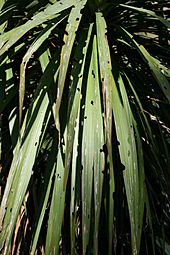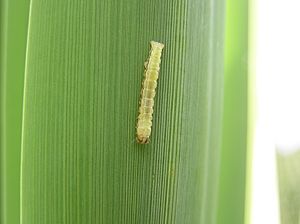Cabbage tree moth facts for kids
Quick facts for kids Cabbage tree moth |
|
|---|---|
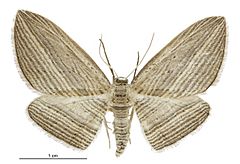 |
|
| female | |
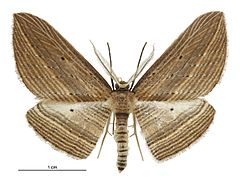 |
|
| male | |
| Scientific classification | |
| Kingdom: | |
| Phylum: | |
| Class: | |
| Order: | |
| Family: | |
| Genus: |
Epiphryne
|
| Species: |
E. verriculata
|
| Binomial name | |
| Epiphryne verriculata (Felder & Rogenhofer, 1875)
|
|
| Synonyms | |
|
|
The cabbage tree moth, also known as Epiphryne verriculata, is a special type of moth. It belongs to the family Geometridae. This moth is only found in New Zealand. It has a very unique diet, eating only the native cabbage tree, which is called Cordyline australis. Its wings have patterns that help it blend in perfectly with dead cabbage tree leaves.
Contents
What's in a Name?
The cabbage tree moth was first described in 1875. Three scientists, Baron Cajetan von Felder, Rudolf Felder, and Alois Friedrich Rogenhofer, gave it its first scientific name, Cidaria verriculata.
Where Do They Live?
This moth is endemic to New Zealand. This means it lives naturally only in New Zealand and nowhere else. It is very common and can be found all over the country. You can find them in wet areas and native forests. They also live in city parks and gardens. This is because cabbage trees are often planted there.
Life Cycle of the Moth
The cabbage tree moth goes through several stages as it grows. This is called its life cycle.
Eggs: Tiny Green Beginnings
The eggs of the cabbage tree moth are bright green. Female moths lay them on the underside of leaves. They are placed in neat, straight rows. This usually happens in autumn and spring. As the eggs get older, their color changes. They go from bright green to brown, and then finally to red. After about two weeks (14 days), the eggs hatch. Then, tiny caterpillars come out.
Larva: The Hungry Caterpillar
The caterpillar of the cabbage tree moth is green. It has red and dark brown lines on its body. When it is fully grown, it is about 2.5 centimeters (1 inch) long. At night, these caterpillars eat the new leaves of the Cordyline australis tree. Their flat bodies help them squeeze into the tightly packed, unopened leaves.
The caterpillars leave a special mark on the leaves. At first, they make small holes and dark lines. As they grow bigger, they start to make notches along the edge of the leaf. When the leaf opens up and gets bigger, these notches also grow. They become much easier to see. The caterpillars grow to about 25 millimeters (1 inch) long. Then, they turn into pupae. They might do this on the cabbage tree itself, in cracks or dead leaf bases. Or, they might go down to the ground underneath the tree.
Adult: The Camouflage Master
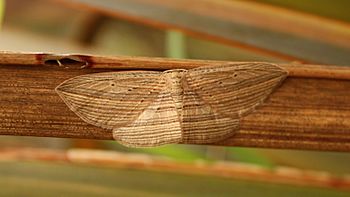
The adult moth has a wingspan of about 40 millimeters (1.5 inches). You can see adult moths from spring to late summer. This is usually from October to May. The cabbage tree moth has light brown wings. These wings have parallel stripes that look like the veins in dead cabbage tree leaves.
When the moth rests, it sits with its body across the leaf. Its wings are pressed flat against the leaf. This makes its markings line up perfectly with the leaf veins. This amazing camouflage helps it hide from animals that might want to eat it. If something disturbs the moth, it will only fly a short distance. Then, it quickly finds another dead brown leaf to land on. It avoids the fresh green leaves. Even though adult moths are attracted to light, they are hard to spot during the day. This is because they are so good at blending in.
Is It Endangered?
The cabbage tree moth (Epiphryne verriculata) is very common. It lives all over New Zealand. Because of this, it is not considered to be in danger of disappearing.
 | Isaac Myers |
 | D. Hamilton Jackson |
 | A. Philip Randolph |


